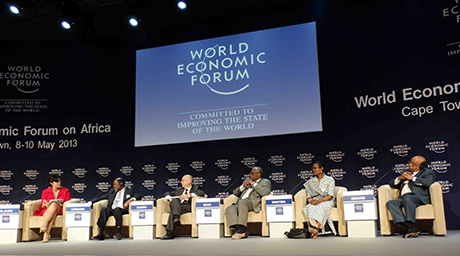
“If you want politicians to give up power, it’s got to be attractive for them to do that,” stated Yale professor Ian Shapiro on May 9 at the World Economic Forum (WEF) on Africa, which brought together more than 1,000 global business, government, and academic leaders in Cape Town.
Shapiro, Sterling Professor of Political Science and the Henry R. Luce Director of the Whitney and Betty MacMillan Center for Area Studies, participated in the forum’s “Governance Best Practices” plenary session. Shapiro shared the stage with some of the continent’s leading NGO, political, and economic leaders: former president of Mozambique Joaquim Chissano; Sudanese businessman Mo Ibrahim; vice-chair of Transparency International, Akere Muna; and head of Oxfam International, Winnie Byanyima. The panelists shared insights about governance problems in Africa and suggestions for improvement.
Moderator Raenette Taljaard, public policy lecturer at the University of Cape Town, noted at the beginning of the session that a discussion on improving African governance is crucial today. With the recent discovery and exploitation of natural resources—gas, minerals, gold, and oil—as well as increased foreign direct investment, and booming markets, Africa is on the cusp of massive economic growth, noted Taljaard. To ensure that this increased wealth is spent equitably, reaches every citizen, and improves the standard of living for all, responsible, inclusive, and participatory governance are imperative, she said.
Looking at the current state of affairs, the panelists pointed out many unresolved issues—corruption remains endemic, government and business activity remains undisclosed, and legislation does not adequately curtail the actions of politicians. Chissano expressed hope throughout the discussion, noting that over the past decade, the continent has seen increased political awareness, more active citizenries, and a great degree of youth participation across the continent.
Yet, there is a long road ahead, noted the panelists. To improve governance and ensure growth throughout Africa, the panel agreed, politicians, citizens, civil society, and businesses all need to be actively involved.
Shapiro noted that politicians might be more inclined to give up power if they could take up good jobs in a more robust economy.
Shapiro stressed the importance of incentivizing politicians to step down from office. “The key to that is diversification of the economy,” he said. When politicians stand to gain from pursuing alternatives to politics—such as working in a vibrant private sector—they will be much more likely to give up power, he noted.
Byanyima and Muna focused on the role of the public. They urged citizens across the continent to be more engaged, hold their governments accountable, and demand more transparency. They also encouraged civil society groups to become more active—to increase citizen awareness of government action and to coordinate citizen response to government’s bad behavior.
Ibrahim urged the corporate sector to act more responsibly, and foreign governments to monitor and penalize foreign companies operating in Africa that exploit workers, skirt business ethics, and conduct corrupt dealings.
Shapiro’s participation in WEF Africa is just one example of the variety of ways Yale’s faculty, students, and scholars are involved on the continent. The Whitney and Betty MacMillan Center for Area Studies, the University’s focal point for encouraging and coordinating teaching and research on international affairs, societies, and cultures around the world, houses the Council on African Studies. Yale’s engagement with Africa extends beyond the classroom, including Yale School of Medicine projects on infectious disease in Ghana; Global Health Initiative collaborations with governments and medical hospitals in Ethiopia and South Africa; and economic growth research in East and West Africa. To learn more about Yale in Africa, visit http://world.yale.edu/regions/africa.
A webcast of this plenary session can be viewed at http://new.livestream.com/wef/events/2075421.
The World Economic Forum is an independent international organization committed to improving the state of the world by engaging business, political, academic, and other leaders to shape global, regional, and industry agendas. Incorporated as a not-for-profit foundation in 1971 and headquartered in Geneva, Switzerland, the forum does not serve any political, partisan, or national interests.
